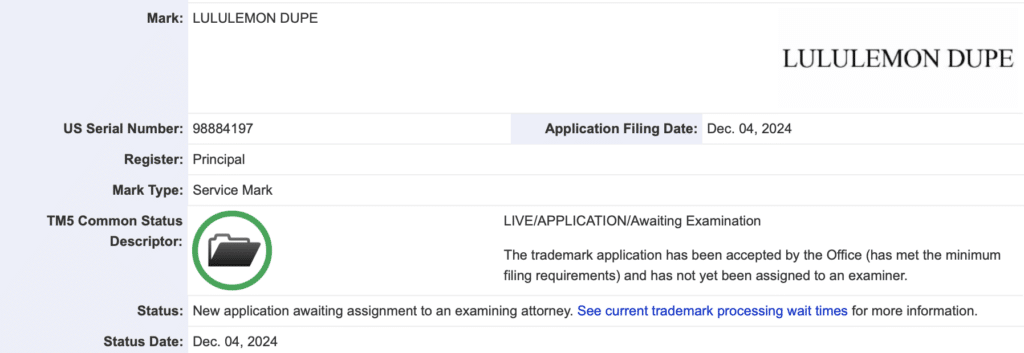A quick web search reveals something you might already know: Lululemon wares are the target of a seemingly endless array of dupes – from lookalike leggings to copycat sports bras. “Less expensive versions of premium products have become an acceptable alternative, particularly for younger shoppers,” the Wall Street Journal’s Suzanne Kapner wrote this summer. And the fact that dupes are sometimes “considered cooler than the real thing” is “becoming a problem for [Lululemon], the company that pioneered high-end athleisure and made $100 leggings the norm.”
Against that background, it appears that one of the most heavily-duped companies may have something up its sleeve if a recent trademark application for registration is any indication. Lululemon quietly filed a trademark application for registration late last year for the “LULULEMON DUPE” word mark for use on retail store and advertising services featuring clothing, footwear, yoga and athletic accessories, etc.

Since the application has been filed on an intent to use basis, it is not immediately clear what exactly Lululemon is planning. However, the filing is worthy of attention in light of the athleisure giant’s budding track record of angling to address the surge in dupes in an extra-judicial capacity – something that speaks to the company’s strategic thinking, as well as to the unique legal and commercial challenges that dupes present for companies.
Lululemon is no stranger to enforcing its rights, including its registered trademarks, such as its name and “Align,” the style name of one of its hottest-selling leggings, for example, and its patent-protected designs. In one such dispute, Lululemon threated Peloton with trademark and patent infringement litigation as a result of its sale of “copycat” wares, prompting Peloton to file a since-settled declaratory judgment case in 2021.
In that case, Lululemon had trade dress rights and design patents to rely on in arguing that Peloton was in the wrong for offering up copycat workout wares. With dupes, on the other hand, the fight can be far more challenging for brands since dupes (in the traditional sense) do not include protected elements of the product being copied, thereby, taking infringement claims off the table and leaving brand owners with few (if any) legal claims to wage in their favor. (Ganni learned this recently in its unsuccessful bid to shutdown Steve Madden’s sale of lookalike footwear.)
Nonetheless, Lululemon has, on at least one occasion, opted to respond to surging demand for dupes in something of an unconventional capacity. Back in 2023, the company called on customers to trade in their knockoffs of its wildly-popular Align pants for the real thing, hosting a two-day “dupe swap” at one of its Los Angeles outposts. The event attracted approximately 1,000 attendees – 50 percent of which were new to the brand and half were under the age of 30.
“It felt like a very fun way to step into a cultural conversation,” Lululemon chief brand officer Nikki Neuburger said at the time, noting that the initiative was designed to showcase Lululemon’s superior products by allowing consumers to experience the authentic Align leggings firsthand (and presumably, convert some to Lululemon customers.)
Stay tuned for what Lululemon has planned for its “LULULEMON DUPE” mark.













